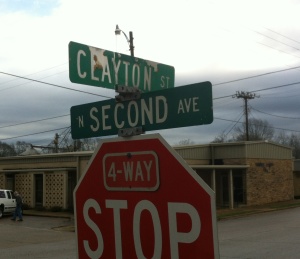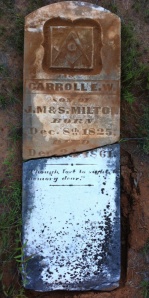The following two passages are reprinted, with minor punctuation adjustments, from the diary of Carroll E. W. Milton – a photographer, teacher, surveyor and keen observer of humanity – who lived just north of Carrollville, Mississippi, and worked on the M & O Rail Road in 1854.
Sunday, June 4th, 1854
[I was] in the office [on the] 1st, 2nd, 3rd, [and also] down below staking for Lindsey and Gambrell.
A terrible encounter and death [occurred]. Yesterday evening as I came through Carrollville home, I witnessed a shocking spectacle, a quarrel arising between Ayers of the one part [and] old Bill Humphrey and Wilson Jones of the other. Ayers retreated; Jones advanced upon him for a fisticuff, I suppose. Ayers drew a bowie knife [and] struck him in the thigh, thereby causing Jones’ death in 20 minutes by loss of blood. Ayers was immediately brought before Esquire Strange for trial and committed to jail, there to await his trial by court next fall. Comment is unnecessary. Suffice it to say that Jones was esteemed by all who knew him, while the reverse is applicable to Ayers. Both parties were somewhat intoxicated, and the terrible deed committed behind the counter in Kent’s doggery, where the blood stains of the murdered man will ever remain an eloquent though silent monitor to all who indulge too freely at such foul dens.
An advocate of temperance reforms could in this case gather material for a touching lecture – the sorrowing and widowed wife, the babes, etc., etc., etc., thus bereft of a kind husband and affectionate father, etc., etc., etc. I leave the reader to extend the picture if he or she will, as I never spread myself that way.
Heigh ho! I am getting tired. Warm this evening [at] 3 o’clock. I – yes! – I shaved this morning [and] turned out a beautiful goatee! Red!
While staking and cutting the Mobile & Ohio Rail Road bed across old Tishomingo and Itawamba Counties in June of 1854, Carroll Milton, red goatee and all, recorded just what the volatile combination of alcohol and sweltering summer heat in Mississippi often produced among rough men on the edge of civilization. June was hot, and it wasn’t over.
Sunday, June 18th, 1854
[I] staked for Mosley [and] Petty and tried to re-stake some for Robinson but couldn’t excavate beyond the limits. [I was] in the office [for] two days, etc., etc.
All of this happened in the week past “of course,” and that is not all. On Thursday, at Robinson’s store on the railroad, near the turnpike on Twenty Mile – Is that definite enough? I suppose so – then, on last Thursday, 15th inst. as above set forth, Mr. “What-you-can-call-him” Kirbys killed Jenk Lyre, the particulars of the affray I have not learned. The one that shot Lyre has taken up his abode in the county prison at Jacinto, awaiting a higher promotion, while his aider and abettor took “leg bail,” caring not to be promoted to such a responsible situation by his dear fellow citizens!
And on the same day, or night rather – Thursday night – Mr. James Lester, yeoman of this vicinity, did in the dark stilly night proceed to the dwelling of J.C. Carpenter and from thence entice his – Carpenter’s – daughter from the parental roof and were of twain made one flesh, for which piece of audacity Lester was challenged by the injured father to fight a duel at 60 paces with rifles! Which was a matter of course in such cases, [but] Lester passed unnoticed.
These telling passages from the diary Carroll E. W. Milton paint a pretty clear picture. It seems the nature of man around old Carrollville in the heat of June in 1854 was not so very different from the nature of man in 2013. The more things change, the more they stay the same.




